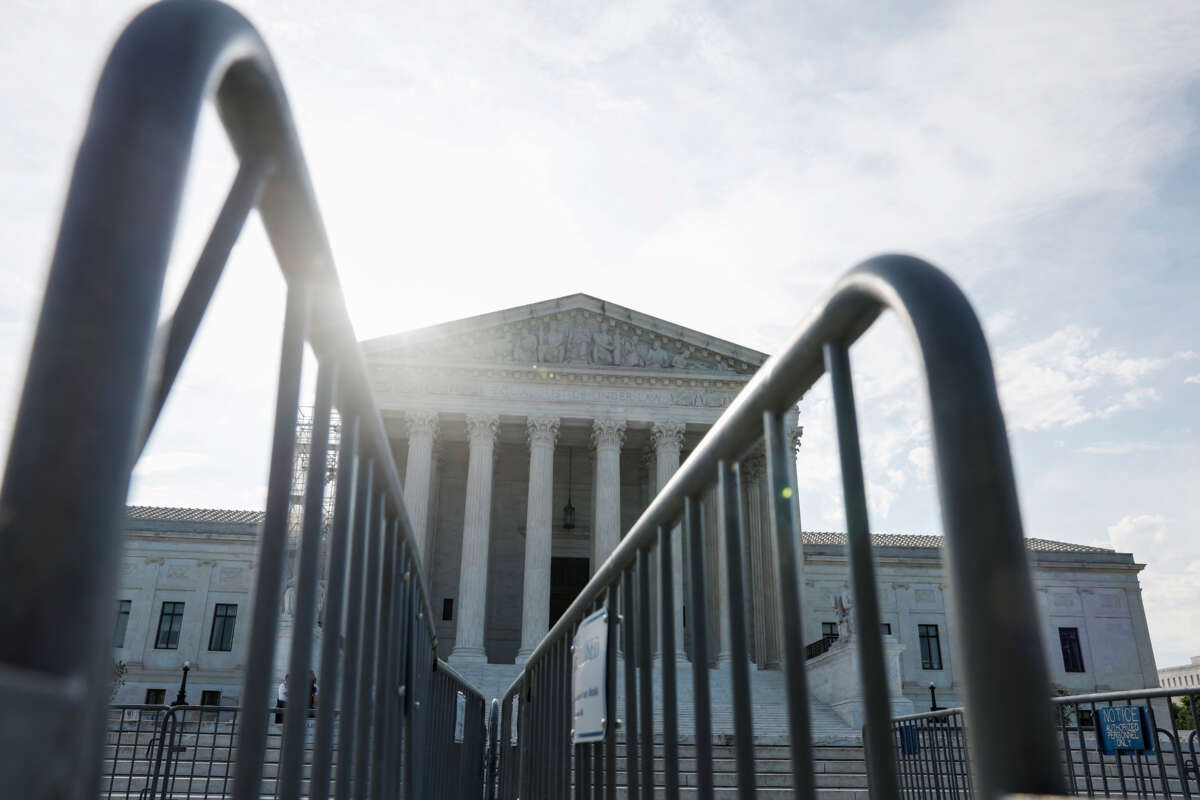The U.S. Supreme Court has rejected a novel legal theory that would have limited the ability of courts to be a check on state legislatures’ redrawing of state and congressional districts.
On Tuesday, the High Court ruled, in Moore v. Harper, against the independent state legislature theory, a fringe idea that there is a constitutional separation between state courts and state legislatures that disallows the former from ruling on election laws enacted by the latter. The theory specifically purports that state and federal courts cannot interpret the legality of election maps drawn by state legislatures.
The case involved the redrawing of congressional maps in North Carolina prior to the 2020 election cycle, in which Republicans created political boundaries that experts said would have given them an incredible advantage. The map they produced would likely have resulted in a 10-4 GOP majority within North Carolina’s congressional delegation.
After the state Supreme Court deemed the maps illegal and tantamount to a political gerrymander, a separate commission created a new map, which produced a 7-7 outcome between Democrats and Republicans — an outcome that better aligns with the evenly-divided split among North Carolinian voters. Republicans appealed that ruling to the federal Supreme Court, using arguments based on the independent state legislature theory, claiming that the Constitution disallowed the state Supreme Court from interfering with the maps.
Had it been endorsed by the Supreme Court, the legal theory could have permitted a vast escalation in partisan gerrymandering, not just in North Carolina but throughout the country, preventing courts from finding redistricting maps — which are redrawn every ten years — unconstitutional on a number of grounds.
Beyond the potential for unleashing political gerrymanders, the legal theory would have disallowed state elections commissions from enacting rules and regulations, denying dozens of agencies across the country the ability to make emergency decisions on critical election-related matters.
Instead, the Court rejected the idea by a 6-3 vote. In his opinion for the Court, conservative Chief Justice John Roberts was joined by conservative Justices Brett Kavanaugh and Amy Coney Barrett, as well as liberal Justices Elena Kagan, Ketanji Jackson Brown and Sonia Sotomayor. Conservative Justices Clarence Thomas, Samuel Alito and Neil Gorsuch dissented.
“Since early in our Nation’s history, courts have recognized their duty to evaluate the constitutionality of legislative acts,” Roberts wrote in the Court’s opinion, noting that this includes state directives involving elections.
Roberts also pointed out the holes in the legal theory pushed by North Carolina Republicans. “The argument advanced by the defendants…does not account for the Framers’ understanding that when legislatures make laws, they are bound by the provisions of the very documents that give them life,” Roberts wrote. This includes provisions that give courts the ability to review legislative actions or law, he added.
Beyond internal state deliberations, “state courts do not have free rein” to decide on these matters either, Roberts wrote, adding, “as in other areas where the exercise of federal authority or the vindication of federal rights implicates questions of state law, we have an obligation to ensure that state court interpretations of that law do not evade federal law.”
Roberts went on:
State courts retain the authority to apply state constitutional restraints when legislatures act under the power conferred upon them by the Elections Clause. But federal courts must not abandon their own duty to exercise judicial review.
Although the legal theory presented by Republicans in North Carolina’s state legislature was viewed as likely to fail, there were real concerns that conservative justices would opt to adopt it, especially given Alito’s ties to a key player in the case.
Alito’s federal career began in the Reagan administration, during which he served under Charles Cooper, who was a deputy in the Justice Department’s Civil Rights Division. Decades later, Cooper testified favorably for Alito during his confirmation hearings.
Cooper’s law firm, Cooper & Kirk, represented the Republican lawmakers in Moore v. Harper. Although Alito dissented with the ruling, stating that he didn’t believe the Court should have even entertained the idea in the first place, he didn’t indicate whether or not he backed the fringe legal theory.
The ruling from the Supreme Court on Tuesday was widely celebrated by legal experts.
“SCOTUS rightly rejected the utterly groundless ‘independent state legislature’ theory that would’ve upended democracy and the rule of law,” Laurence Tribe, professor emeritus at Harvard Law School, wrote on Twitter.
J. Michael Luttig, a former federal judge within the U.S. Court of Appeals for the Fourth Circuit (which North Carolina is a part of), also lauded news of the ruling.
“The Supreme Court’s long-awaited decision in Moore v. Harper is a resounding, reverberating victory for American Democracy,” Luttig, who was a conservative judge, said in a tweet.
Our most important fundraising appeal of the year
December is the most critical time of year for Truthout, because our nonprofit news is funded almost entirely by individual donations from readers like you. So before you navigate away, we ask that you take just a second to support Truthout with a tax-deductible donation.
This year is a little different. We are up against a far-reaching, wide-scale attack on press freedom coming from the Trump administration. 2025 was a year of frightening censorship, news industry corporate consolidation, and worsening financial conditions for progressive nonprofits across the board.
We can only resist Trump’s agenda by cultivating a strong base of support. The right-wing mediasphere is funded comfortably by billionaire owners and venture capitalist philanthropists. At Truthout, we have you.
We’ve set an ambitious target for our year-end campaign — a goal of $250,000 to keep up our fight against authoritarianism in 2026. Please take a meaningful action in this fight: make a one-time or monthly donation to Truthout before December 31. If you have the means, please dig deep.
